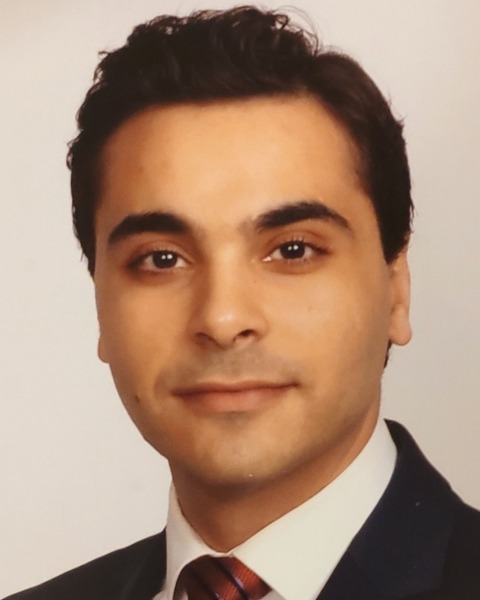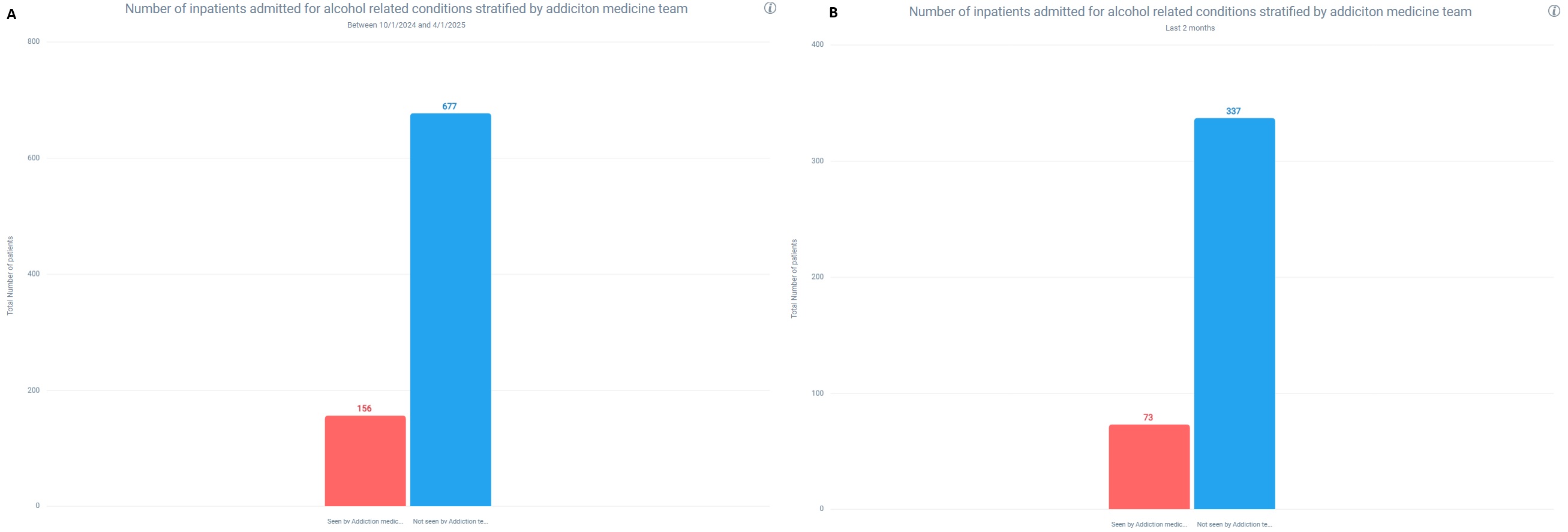Monday Poster Session
Category: Liver
P3807 - Addiction Medicine Consultation Rates for Inpatients with Alcohol Use Disorder Remain Unchanged After Gastroenterology Led Awareness Efforts
Monday, October 27, 2025
10:30 AM - 4:00 PM PDT
Location: Exhibit Hall

Hani Shamseddeen, MD
Indiana University School of Medicine
Greenwood, IL
Presenting Author(s)
Hani Shamseddeen, MD1, Andrew Ortega, DO2, Yervant Ichkhanian, MD2, Joe Ma, MD3, Serge Baroud, MD2, Alexander Scherer, MD2, Shay Bailey, MD2, Benjamin Byriel, DO2, Ramzi Hassouneh, DO2, Jason Browne, MD2, Azizullah Beran, MD2, Marta Arjonilla, MD2, Hareem Syed, MD2, Sarah Yates, DO2, Elizabeth Williams, MD2, Kaela Miller, MD2, Niharika Samala, MD2, Archita P.. Desai, MD2, Nabil Fayad, MD2
1Indiana University School of Medicine, Greenwood, IL; 2Indiana University School of Medicine, Indianapolis, IN; 3MD, Indianapolis, IN
Introduction: The prevalence of alcohol-related hospitalizations is increasing, including among patients with gastroenterological conditions due to alcohol use. The AASLD in its most recent guidelines on alcohol related liver disease, highlights the importance of abstinence and recommends multidisciplinary management with addiction specialists and referral to treatment which includes psychosocial/behavioral and medical approaches. We aimed to explore the barriers to addiction medicine referrals by gastroenterologists and to improve those rates.
Methods: We created a questionnaire to identify the barriers to addiction medicine referrals in Eskenazi hospital, which is the public hospital division of the Health & Hospital Corporation of Marion County serving a diverse population of patients across central Indiana. Our questionnaire was circulated among the Indiana University Gastroenterology department faculty and fellows. We also shared relevant educational material about treatment of alcohol use disorder. We assessed the referral rate to the addiction medicine service before and after the questionnaire and educational material using Epic’s Slicer Dicer tool.
Results: We received a total of 27 responses to our questionnaire. This allowed us to identify two major barriers to addiction medicine referrals in inpatients with alcohol use disorder (AUD). Those were physicians not knowing that there’s an addiction medicine service at Eskenazi and patient unwillingness to engage in AUD treatments. In the six months prior to our study out of 833 inpatients with AUD, 156 (18%) were referred to the addiction service. We waited for two months after the questionnaire and educational material distribution and queried Slicer Dicer again. Out of 410 inpatients with AUD, 73 (18%) were referred to addiction medicine (Figure 1).
Discussion: We showed that even after increasing awareness of the available resources, we were not able to increase the referral rates to the addiction medicine service. This is likely due to patient unwillingness to participate in AUD treatment as was highlighted in our questionnaire. Patient-centered educational efforts to improve awareness and openness towards AUD treatments are needed.

Figure: Figure 1. The number of inpatients with AUD referred to addiction medicine in the six months prior (A) and in the two months after (B) the questionnaire and educational material.
Disclosures:
Hani Shamseddeen indicated no relevant financial relationships.
Andrew Ortega indicated no relevant financial relationships.
Yervant Ichkhanian indicated no relevant financial relationships.
Joe Ma indicated no relevant financial relationships.
Serge Baroud indicated no relevant financial relationships.
Alexander Scherer indicated no relevant financial relationships.
Shay Bailey indicated no relevant financial relationships.
Benjamin Byriel indicated no relevant financial relationships.
Ramzi Hassouneh indicated no relevant financial relationships.
Jason Browne indicated no relevant financial relationships.
Azizullah Beran indicated no relevant financial relationships.
Marta Arjonilla indicated no relevant financial relationships.
Hareem Syed indicated no relevant financial relationships.
Sarah Yates indicated no relevant financial relationships.
Elizabeth Williams indicated no relevant financial relationships.
Kaela Miller indicated no relevant financial relationships.
Niharika Samala indicated no relevant financial relationships.
Archita Desai: Eli Lilly – Consultant.
Nabil Fayad indicated no relevant financial relationships.
Hani Shamseddeen, MD1, Andrew Ortega, DO2, Yervant Ichkhanian, MD2, Joe Ma, MD3, Serge Baroud, MD2, Alexander Scherer, MD2, Shay Bailey, MD2, Benjamin Byriel, DO2, Ramzi Hassouneh, DO2, Jason Browne, MD2, Azizullah Beran, MD2, Marta Arjonilla, MD2, Hareem Syed, MD2, Sarah Yates, DO2, Elizabeth Williams, MD2, Kaela Miller, MD2, Niharika Samala, MD2, Archita P.. Desai, MD2, Nabil Fayad, MD2. P3807 - Addiction Medicine Consultation Rates for Inpatients with Alcohol Use Disorder Remain Unchanged After Gastroenterology Led Awareness Efforts, ACG 2025 Annual Scientific Meeting Abstracts. Phoenix, AZ: American College of Gastroenterology.
1Indiana University School of Medicine, Greenwood, IL; 2Indiana University School of Medicine, Indianapolis, IN; 3MD, Indianapolis, IN
Introduction: The prevalence of alcohol-related hospitalizations is increasing, including among patients with gastroenterological conditions due to alcohol use. The AASLD in its most recent guidelines on alcohol related liver disease, highlights the importance of abstinence and recommends multidisciplinary management with addiction specialists and referral to treatment which includes psychosocial/behavioral and medical approaches. We aimed to explore the barriers to addiction medicine referrals by gastroenterologists and to improve those rates.
Methods: We created a questionnaire to identify the barriers to addiction medicine referrals in Eskenazi hospital, which is the public hospital division of the Health & Hospital Corporation of Marion County serving a diverse population of patients across central Indiana. Our questionnaire was circulated among the Indiana University Gastroenterology department faculty and fellows. We also shared relevant educational material about treatment of alcohol use disorder. We assessed the referral rate to the addiction medicine service before and after the questionnaire and educational material using Epic’s Slicer Dicer tool.
Results: We received a total of 27 responses to our questionnaire. This allowed us to identify two major barriers to addiction medicine referrals in inpatients with alcohol use disorder (AUD). Those were physicians not knowing that there’s an addiction medicine service at Eskenazi and patient unwillingness to engage in AUD treatments. In the six months prior to our study out of 833 inpatients with AUD, 156 (18%) were referred to the addiction service. We waited for two months after the questionnaire and educational material distribution and queried Slicer Dicer again. Out of 410 inpatients with AUD, 73 (18%) were referred to addiction medicine (Figure 1).
Discussion: We showed that even after increasing awareness of the available resources, we were not able to increase the referral rates to the addiction medicine service. This is likely due to patient unwillingness to participate in AUD treatment as was highlighted in our questionnaire. Patient-centered educational efforts to improve awareness and openness towards AUD treatments are needed.

Figure: Figure 1. The number of inpatients with AUD referred to addiction medicine in the six months prior (A) and in the two months after (B) the questionnaire and educational material.
Disclosures:
Hani Shamseddeen indicated no relevant financial relationships.
Andrew Ortega indicated no relevant financial relationships.
Yervant Ichkhanian indicated no relevant financial relationships.
Joe Ma indicated no relevant financial relationships.
Serge Baroud indicated no relevant financial relationships.
Alexander Scherer indicated no relevant financial relationships.
Shay Bailey indicated no relevant financial relationships.
Benjamin Byriel indicated no relevant financial relationships.
Ramzi Hassouneh indicated no relevant financial relationships.
Jason Browne indicated no relevant financial relationships.
Azizullah Beran indicated no relevant financial relationships.
Marta Arjonilla indicated no relevant financial relationships.
Hareem Syed indicated no relevant financial relationships.
Sarah Yates indicated no relevant financial relationships.
Elizabeth Williams indicated no relevant financial relationships.
Kaela Miller indicated no relevant financial relationships.
Niharika Samala indicated no relevant financial relationships.
Archita Desai: Eli Lilly – Consultant.
Nabil Fayad indicated no relevant financial relationships.
Hani Shamseddeen, MD1, Andrew Ortega, DO2, Yervant Ichkhanian, MD2, Joe Ma, MD3, Serge Baroud, MD2, Alexander Scherer, MD2, Shay Bailey, MD2, Benjamin Byriel, DO2, Ramzi Hassouneh, DO2, Jason Browne, MD2, Azizullah Beran, MD2, Marta Arjonilla, MD2, Hareem Syed, MD2, Sarah Yates, DO2, Elizabeth Williams, MD2, Kaela Miller, MD2, Niharika Samala, MD2, Archita P.. Desai, MD2, Nabil Fayad, MD2. P3807 - Addiction Medicine Consultation Rates for Inpatients with Alcohol Use Disorder Remain Unchanged After Gastroenterology Led Awareness Efforts, ACG 2025 Annual Scientific Meeting Abstracts. Phoenix, AZ: American College of Gastroenterology.
